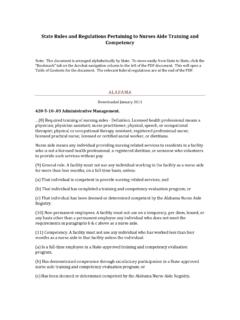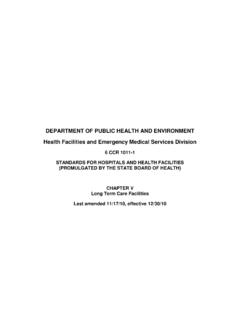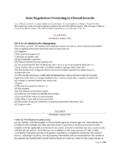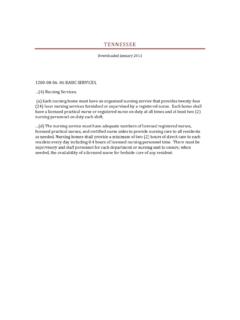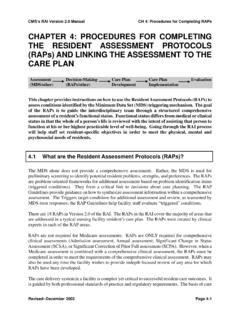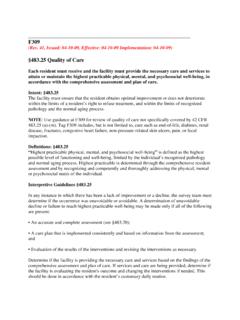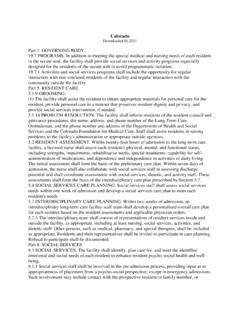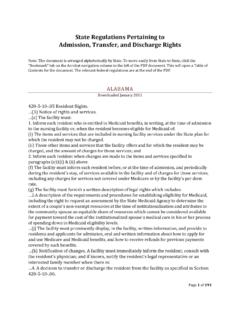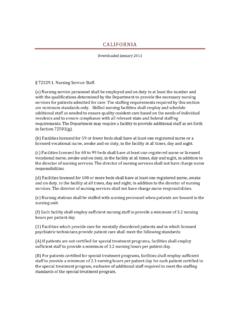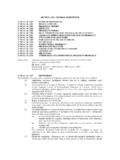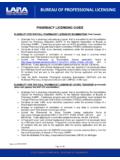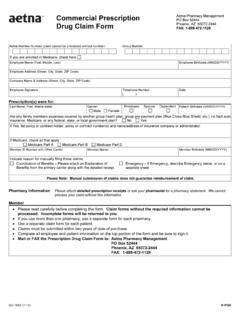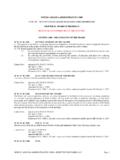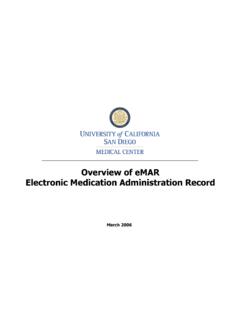Transcription of category pharmacy services FINAL - Academic …
1 NORTH CAROLINA Downloaded January 2011 10A NCAC 13D .2306 MEDICATION ADMINISTRATION (a) The facility shall ensure that medications are administered in accordance with standards of professional practice and applicable occupational licensure regulations. (b) The facility shall ensure that each patient's drug regimen is free from drugs used in excessive dose or duplicative therapy, for excessive duration or without adequate indications for the prescription of the drug. Drugs shall not be used without adequate monitoring or in the presence of adverse conditions that indicate the drugs' usage should be modified or discontinued. (c) Antipsychotic therapy shall not be initiated on any patient unless necessary to treat a clinically diagnosed and clinically documented condition. When antipsychotic therapy is prescribed, unless clinically contraindicated, gradual dose reductions and behavioral interventions shall be employed in an effort to discontinue these drugs.
2 (d) The facility shall ensure that procedures aimed at minimizing medication error rates include, but are not limited to, the following: (1) All medications or drugs and treatments shall be administered and discontinued in accordance with signed medical orders which are recorded in the patient's medical record. Such orders shall be complete and include drug name, strength, quantity to be administered, route of administration, frequency and, if ordered on an as needed basis, a clearly stated indication for use. (2) The requirements for self administration of medication shall include, but not be limited to, the following: (A) determination by the interdisciplinary team that this practice is safe; (B) administration ordered by the physician or other person legally authorized to prescribe medications; (C) specific instructions for administration printed on the medication label; and (D) administration of medication monitored by the licensed nursing staff and consultant pharmacist.
3 (3) The administration of one patient's medications to another patient is prohibited except in the case of an emergency. In the event of such emergency, steps shall be taken to ensure that the borrowed medications are replaced promptly and so documented. (4) Omission of medications and the reason for omission shall be indicated in the patient's medical record. (5) Medication administration records shall provide time of administration, identification of the drug and strength of drug, quantity of drug administered, route of administration, frequency, documentation sufficient to determine the staff who administered the drugs. Medication administration records shall indicate documentation of injection sites and topical medication sites requiring rotation, including, but not limited to, transdermal medication. (6) The pharmacy shall receive an exact copy of each physician's order for medications and treatments. (7) Automatic stop orders for medications and treatments shall be established and implemented.
4 (8) The facility shall maintain an accountability of controlled substances as defined by the North Carolina Controlled Substances Act, 90, Article 5. History Note: Authority 131E 104; Eff. January 1, 1996. SECTION .2600 PHARMACEUTICAL services 10A NCAC 13D .2601 AVAILABILITY OF PHARMACEUTICAL services (a) The facility shall provide pharmaceutical services under the supervision of a pharmacist, including procedures that ensure the accurate acquiring, receiving and administering of all drugs and biologicals. (b) The facility shall be responsible for obtaining drugs, therapeutic nutrients and related products prescribed or ordered by a physician for patients in the facility. (c) To ensure that drug therapy is rational, safe and effective, a pharmaceutical care assessment shall be conducted in the facility at least every 31 days for each patient. All new admissions shall receive a pharmaceutical care assessment at the time of the pharmacist's next visit or within 31 days, whichever comes first.
5 This assessment shall include at least: (1) a review of the patient's diagnoses, history and physical, discharge summary, diet, vital signs, current physician's orders, laboratory values, progress notes, interdisciplinary care plans and medication administration records; and (2) the pharmacist's progress notes in the patient's medical record which reflect the results of this assessment and, if necessary, recommendations for change based on desired drug outcomes. History Note: Authority 131E 104; 131E 117; RRC objection due to lack of statutory authority Eff. July 13, 1995; Eff. January 1, 1996. 10A NCAC 13D .2602 pharmacy PERSONNEL (a) If the pharmacist is an employee of the facility and performs vending or clinical services , an up to date job description and personnel file shall be maintained. (b) If pharmaceutical vending or clinical services are contracted, there shall be a current written agreement for each service which includes a statement of responsibilities for each party.
6 (c) The facility shall keep, or be able to make available, a copy of the current license of the pharmacists . History Note: Authority 131E 104; 131E 117; Eff. January 1, 1996. 10A NCAC 13D .2603 ADMINISTRATIVE RESPONSIBILITIES (a) The pharmacist shall report any potential drug therapy irregularities or discrepancies in drug accountability and administration with recommendations for change to the director of nursing and the attending physician. Recommendations shall be communicated to the health care professionals in the facility who have the authority to effect a change. These reports shall be submitted monthly following the pharmacist's pharmaceutical care assessments. (b) The administrator shall ensure documentation of action taken relative to the pharmacist's reports. History Note: Authority 131E 104; 131E 117; Eff. January 1, 1996. 10A NCAC 13D .2604 DRUG PROCUREMENT (a) The facility shall not possess a stock of prescription legend drugs for general or common use except as permitted by the North Carolina Board of pharmacy and as follows: (1) for all intravenous and irrigation solutions in single unit quantities exceeding 49 ml.
7 And related equipment for the use and administration of such; (2) diagnostic agents; (3) vaccines; (4) drugs designated for inclusion in an emergency kit approved by the facility's Quality Assurance Committee; (5) water for injection; and (6) normal saline for injection. (b) Patient Drugs: (1) The contents of all prescriptions shall be kept in the original container bearing the original label as described in Subparagraph (b)(2) of this Rule. (2) Except in a 72 hour or less unit dose system, each individual patient's prescription or legend drugs shall be labeled with the following information: (A) the name of the patient for whom the drug is intended; (B) the most recent date of issue; (C) the name of the prescriber; (D) the name and concentration of the drug, quantity dispensed, and prescription serial number; (E) a statement of generic equivalency which shall be indicated if a brand other than the brand prescribed is dispensed; (F) the expiration date, unless dispensed in a single unit or unit dose package; (G) auxiliary statements as required of the drug; (H) the name, address and telephone number of the dispensing pharmacy ; and (I) the name of the dispensing pharmacist.
8 (c) Non legend drugs shall be kept in the original container as received from the supplier and shall be labeled as described in Subparagraph (b)(2) of this Rule or with at least: (1) the name and concentration of the drug, and quantity packaged; (2) the name of the manufacturer, lot number and expiration date. History Note: Authority 131E 104; 131E 117; Eff. January 1, 1996. 10A NCAC 13D .2605 DRUG STORAGEAND DISPOSITION (a) The pharmacist and director of nursing shall ensure that drug storage areas are clean, secure, well lighted and well ventilated; that room temperature is maintained between 59 degrees F. and 86 degrees F.; and that the following conditions are met: (1) All drugs shall be maintained under locked security except when under the immediate or direct physical supervision of a nurse or pharmacist. (2) Drugs requiring refrigeration shall be stored in a refrigerator containing a thermometer and capable of maintaining a temperature range of 2 degrees C.
9 To 8 degrees C. (36 degrees F. to 46 degrees F.) Drugs shall not be stored in a refrigerator containing non drugs and non drug related items, except when stored in a separate container. (3) Drugs intended for topical use, except for ophthalmic, otic and transdermal medications, shall be stored in a designated area separate from the drugs intended for oral and injectable use. (4) Drugs that are outdated, discontinued or deteriorated shall be removed from the facility within five days. (b) Upon discontinuation of a drug or upon discharge of a patient, the remainder of the drug supply shall be disposed of promptly. If it is reasonably expected that the patient shall return to the facility and that the drug therapy will be resumed, the remaining drug supply may be held for not more than 30 calendar days after the date of discharge or discontinuation. (c) The disposition of drugs shall be in accordance with written policies and procedures established by the Quality Assurance Committee.
10 (d) Destruction of controlled substances shall be incompliance with North Carolina Controlled Substance Act and Regulations (10A NCAC 26E) which is hereby incorporated by reference including subsequent amendments. Copies of the rules may be obtained from the Drug Regulatory Branch, Division of Mental Health, Developmental Disabilities and Substance Abuse services , 3016 Mail Service Center, Raleigh, NC 27699 3016 at a cost of thirteen dollars ($ ). History Note: Authority 131E 104; 131E 117; RRC objection due to lack of statutory authority Eff. July 13, 1995; Eff. January 1, 1996. 10A NCAC 13D .2606 PHARMACEUTICAL RECORDS (a) The pharmacist shall ensure that accurate records of the receipt, use and disposition of drugs are maintained and readily available. (b) The director of nursing and pharmacist shall ensure accountability of controlled substances as defined by the North Carolina Controlled Substances Act and Regulations (10A NCAC 26EG) which is hereby incorporated by reference including subsequent amendments.
